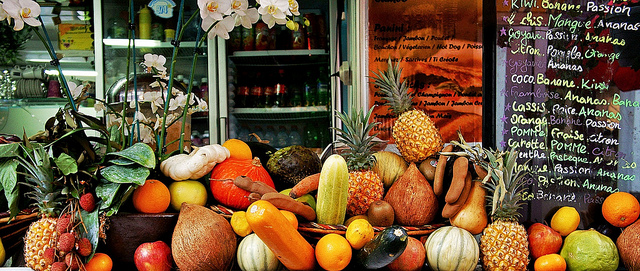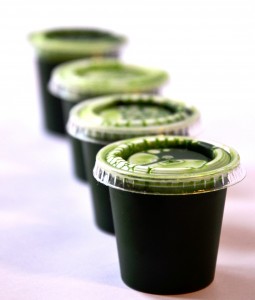This is the second part of our article about vitamins. Part 1 was to explain in how vitamins and minerals work in general. In this second part – without exhausting the topic fully – we will concentrate on the vitamins in wheatgrass / spelt grass juice and what these vitamins are proven to do in your body. So we are going to talk about Vitamin A , B1, B2, B3, B5, B6, B7(H), B12, B17, C, D, E and Vitamin K. Some minerals (Calcium, Iron, Magnesium, Potassium, Sodium, Selenium and Zinc) to follow in a future blog.
Fat soluble Vitamins:
Vitamin A (carotene):
Known to strengthen your immune system and have a positive effect on your eye sight, hair, skin and nails. In addition it helps cell growth and plays a crucial part in keeping your inner organs healthy. There are two forms of vitamin A: preformed vitamin A (animal sources including dairy) and provitamin A carotenoids (in plants). Our bodies convert the provitamins into vitamin A and only as much as we need, so we cannot overdose it as long as we don’t take any supplements, as these rules don’t apply to these products. So unless advised by doctors based on measured vitamin A deficiency, taking these supplements can cause more harm than good. I’d advise to eat more carrots, sweet potatoes, pumpkins and drink your wheatgrass instead to stay on the safe side 😉
Vitamin D (calciferol )
It plays an important role in bone development as it maintains the calcium levels in the blood and promotes its absorption. Also strengthens the immune system and prevents cell overgrowth in some types of cancer (prostate, breast and bowel problems)
Very few foods naturally have vitamin D, fatty fish such as salmon, tuna, and mackerel are among the best sources. The body makes vitamin D when skin is directly exposed to the sun, so make sure that you spend some time outdoors, but limit your time according to your skin’s sensitivity. If you can’t spend time out on the sun…one more reason to start liking wheatgrass 🙂
Vitamin E (Tokotrienol)
Antioxidant, strengthens the eyes and the immune system to fight off invading bacteria and viruses, protects against or treats existing heart disease. Also protects the cells from radicals and reduces the chances of cancer. Food sources are vegetable oils (like wheat germ, sunflower, and safflower oils), nuts and seeds and green vegetables including grasses like wheatgrass.
Vitamin K
This vitamin is important for blood clotting and healthy bones and also has other functions in the body. The main sources are green leafy vegetables, such as spinach, kale, broccoli, lettuce and wheatgrass of course. Also can be found in vegetable oils, nuts, eggs and green tea.
Water soluble vitamins:
Vitamin C – Ascorbic Acid
Nobody argues the values of vitamin C. It is water soluble and has strong antioxidant effect and takes part in lots and lots of processes. Just to mention a few:
- strengthens the immune system

- is utilised by enzymes working in the liver and gall
- lowers cholesterol levels
- lowers blood pressure
- is needed to produce collagen, the protein of connective tissue, therefore is crucial in the maintenance of muscles, tendons, arteries, bines and skin
- helps to prevent cancer and heart disease
So stuff a load of Vitamin C in every day, as you cannot overdose it but is extremely crucial for your health! Eat loads of peppers, tropical fruits, strawberries, broccoli, Brussel sprouts, tomatoes, drink lemonade made out of real lemon and don’t forget your wheatgrass either.
Vitamin B complex:
The group of all vitamin B is called Vitamin B complex. They are all taking part in the transformation of food to energy, but all types are needed in our body and none of them can replace the other. They are water soluble, which means they need to be replaced daily and cooking in water will result in a great loss of these vitamins. I advise to drink the cooking water or use it as a base for soups.
B1 – Thiamin
It supports the nervous system, heart and mental function and its most known sources are grains, legumes and nuts.
B2 – Riboflavin
It assures normal cell growth, helps the formation of red blood cells and also supports the nervous system and the utilisation of iron in the body. The best source is liver, but also can be found in eggs, dairy products, meat, fish and dark green vegetables.
B3 – Niacin
It plays a role in over 50 chemical processes in our body. B3 helps to keep low cholesterol levels and healthy appetite, supports mental health and the creation of sex hormones, treats diabetes and high blood sugar levels. Fish, red and white meat, liver and nuts can be your other options to increase your intake.
B5 – Pantothrnic acid
It is needed in the formation of blood cells, vitamin D and some hormones. Can be found in all foods.
B6 – Pyridoxine
It supports immune function, brain development and the formation of haemoglobin and is involved in more than 100 enzyme reactions, mainly involving protein metabolism. Unfortunately freezing can decrease the vitamin B6 content by up to 70%, but there is a lot of this amongst the vitamins in wheatgrass juice so you still get a fair dose after defrosting your shot. Top up with chickpeas, liver, fish, poultry or potato.
B7 = Vitamin H – biotin
Your body needs biotin to metabolize carbohydrates, fats, and amino acids, the building blocks of protein. It is very important for normal embryonic growth. Biotin is often recommended for strengthening hair and nails and it’s found in many cosmetic products for hair and skin. It is water soluble, however our body can also produce it. The main food sources are liver, egg, milk and dairy products.
B12 – Cobalamin
Takes part in red cell formation and the maintenance of the central nervous system. Most scientific and non-professional sources state that B12 cannot be found in plants, although some mention germinated seeds and algae as possible source. However it still appears on various wheatgrass products’ content list and other sources also claim the same.
B17 – Laetrile or Amygdalin
It is one of the most controversial components. Some claim it to be beneficial in the treatment of cancer; modern medicine of course does not approve. It is found in over 1200 edible plants including some berries, some beans, grasses (wheat and spelt grass as well), leaves, nuts, flax, bitter alonds, beansprouts, millet and certain fruit seeds.
The idea of its benefits was originally published by Dr Ernst T Krebs (1911 –1996), researcher & biochemist who dedicated his work to this topic but was quickly dismissed and bad mouthed by the pharmaceutical industry.
Dr Krebs argued (very convincingly), that cancer was a symptom of a deficiency of vitamin B17. I advise everyone to do their own internet research and draw their own conclusions…
So have a healthy, balanced diet and drink your wheatgrass every morning to get all these very important vitamins!



